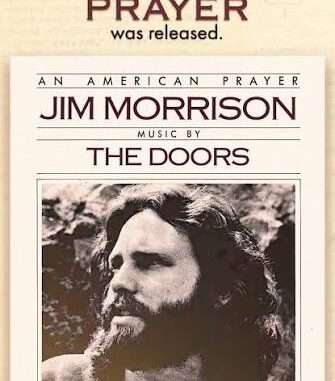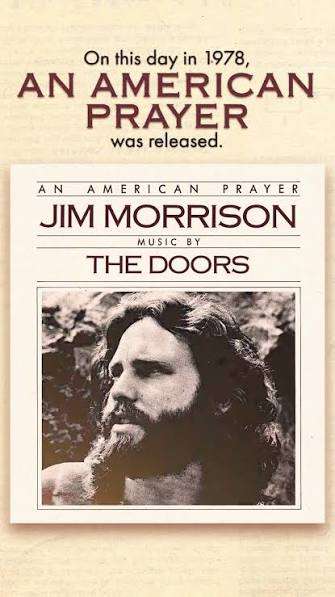
When An American Prayer was released in November 1978, seven years after Jim Morrison’s death, it marked one of the most unusual and haunting entries in the history of rock. It wasn’t a typical album by The Doors — not a set of new songs or live recordings — but a posthumous fusion of Morrison’s poetry and his bandmates’ music. What emerged was part spoken-word album, part musical séance — a conversation between the living and the dead.
The Origins: Morrison the Poet
Before he was a rock icon, **Jim Morrison** saw himself as a poet. Long before the fame, before *Light My Fire* or *L.A. Woman*, Morrison filled notebooks with vivid, surreal verses inspired by **Arthur Rimbaud**, **William Blake**, and the Beat Generation. He often said that music was simply the best vehicle for his poetry — “a way of reaching people with words that burn.”
In 1969 and 1970, while The Doors were still active, Morrison recorded a series of spoken-word poetry sessions at **Elektra Sound Studios** in Los Angeles. He read dozens of his own poems — some cryptic, some confessional, some mystical. Titles like “Awake,” “Bird of Prey,” and “Ghost Song” revealed his fascination with death, transcendence, and the American spirit.
Morrison intended to eventually turn those recordings into a poetry album — one that would stand apart from The Doors’ rock sound. But he never lived to see it happen.
The Resurrection of a Voice
After Morrison’s death in 1971, the tapes of his poetry were quietly archived by Elektra Records. Years passed, and the surviving members of The Doors — **Ray Manzarek**, **Robby Krieger**, and **John Densmore** — pursued solo careers and other projects. Yet Morrison’s voice lingered like a ghost over their memories.
By the late 1970s, with interest in The Doors surging again among a new generation, the bandmates decided to revisit those lost recordings. They listened to the reels of Morrison’s poetry — his voice deep, resonant, full of strange pauses and sudden laughter — and realized they could bring it back to life through music.
The trio returned to the studio to compose and record **new instrumental tracks** to accompany Morrison’s poetry. The result was *An American Prayer* — an album that blurred the lines between music, literature, and performance art.
The Album: A Lyrical Journey Through the American Dream
Released on **November 17, 1978**, *An American Prayer* was unlike anything the rock world had ever heard. It wasn’t a conventional Doors record. Instead, it unfolded as a 54-minute audio experience — a cinematic journey through Morrison’s mind.
The album opens with the haunting “**Awake**,” where Morrison’s voice echoes like an oracle calling across time:
> “Is everybody in? The ceremony is about to begin.”
From there, the listener is swept into a dreamlike landscape of desert visions, sensuality, and spiritual searching. Tracks like “**Ghost Song**,” “**Newborn Awakening**,” and “**Curses, Invocations**” reveal Morrison’s fascination with rebirth and the duality of light and darkness.
The title piece, “**An American Prayer**,” is the emotional centerpiece — a sprawling reflection on what it means to live and die in America. Morrison’s words shift from the mythic to the mundane, capturing both the beauty and decay of the modern world.
Musically, the surviving Doors provided subtle, atmospheric arrangements — often using keyboards, ambient percussion, and guitar textures that weave around Morrison’s voice rather than overpower it. The result feels intimate and timeless, like a séance where the spirit of Morrison is conjured for one last performance.
Controversy and Criticism
Not everyone approved of the project. Some critics and fans questioned whether *An American Prayer* violated Morrison’s artistic intent. **John Densmore**, The Doors’ drummer, later expressed mixed feelings, admitting he was torn between honoring his late friend’s poetry and “repackaging” it for commercial release.
Others saw it as a fitting tribute — a way to fulfill Morrison’s dream of releasing a poetry album, even if posthumously. **Ray Manzarek** defended the project passionately, saying:
> “We didn’t make this for the money. We made it because Jim was our brother, and this was his unfinished work. We wanted to help him finish it.”
Legacy: The Spirit Lives On
Despite the divided opinions, *An American Prayer* became a commercial success, eventually achieving **platinum certification**. The album also earned a **Grammy nomination** for Best Spoken Word Recording — a rare accolade for a rock-poet hybrid.
Over the years, its influence has grown. Songs like “**Ghost Song**” have been sampled by artists from electronic to alternative genres, and the album remains a cult favorite among fans who see it as Morrison’s final testament — the completion of his poetic vision.
Listening today, *An American Prayer* feels like a bridge between eras — the 1960s counterculture and a darker, more reflective modern age. It’s Jim Morrison stripped of myth and music, speaking directly to the listener, his words suspended in the eternal space between life and legend.
“We live, we die, and death not ends it.” — *Jim Morrison, An American Prayer
Leave a Reply